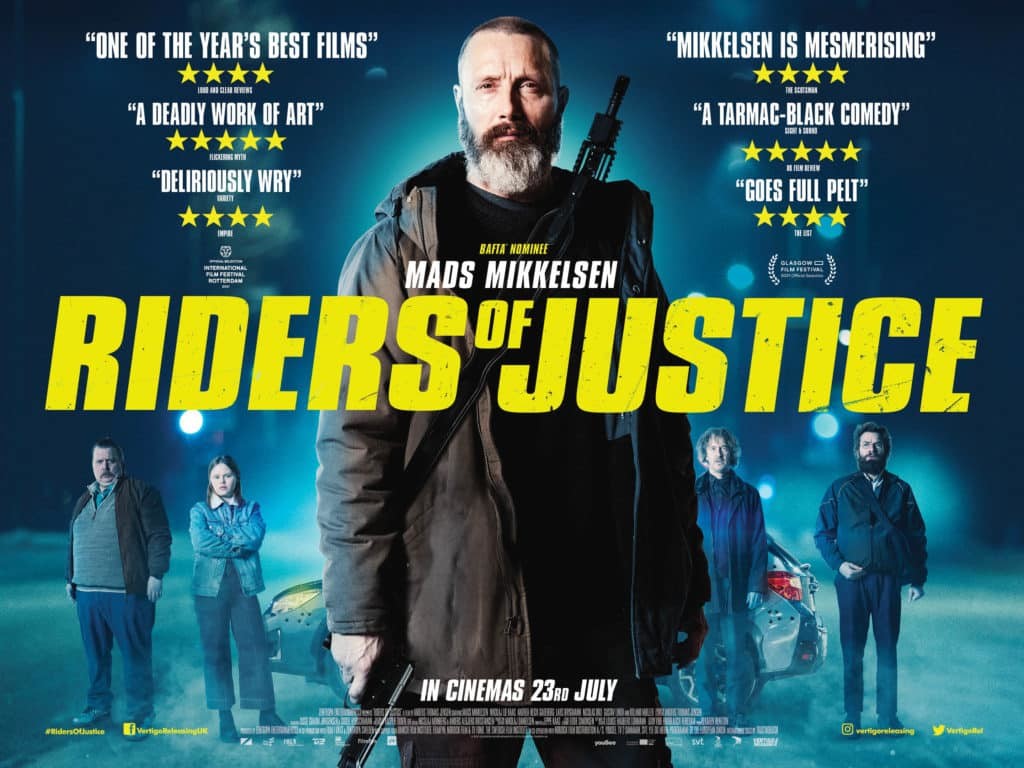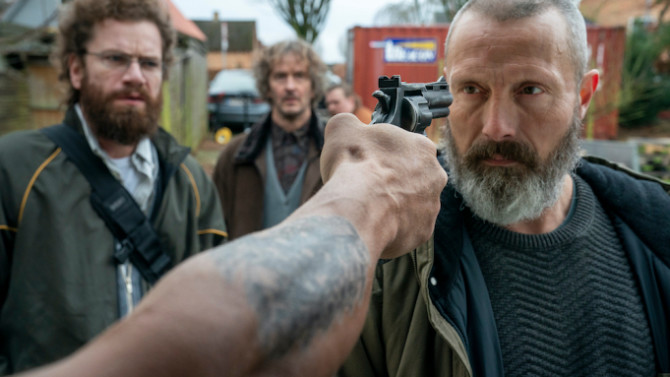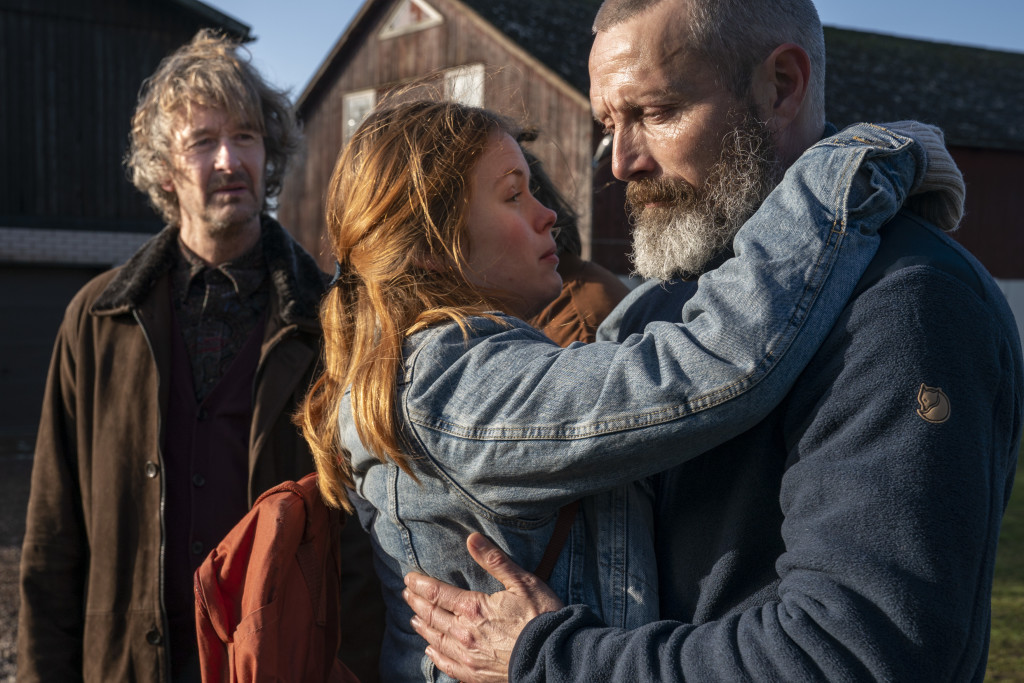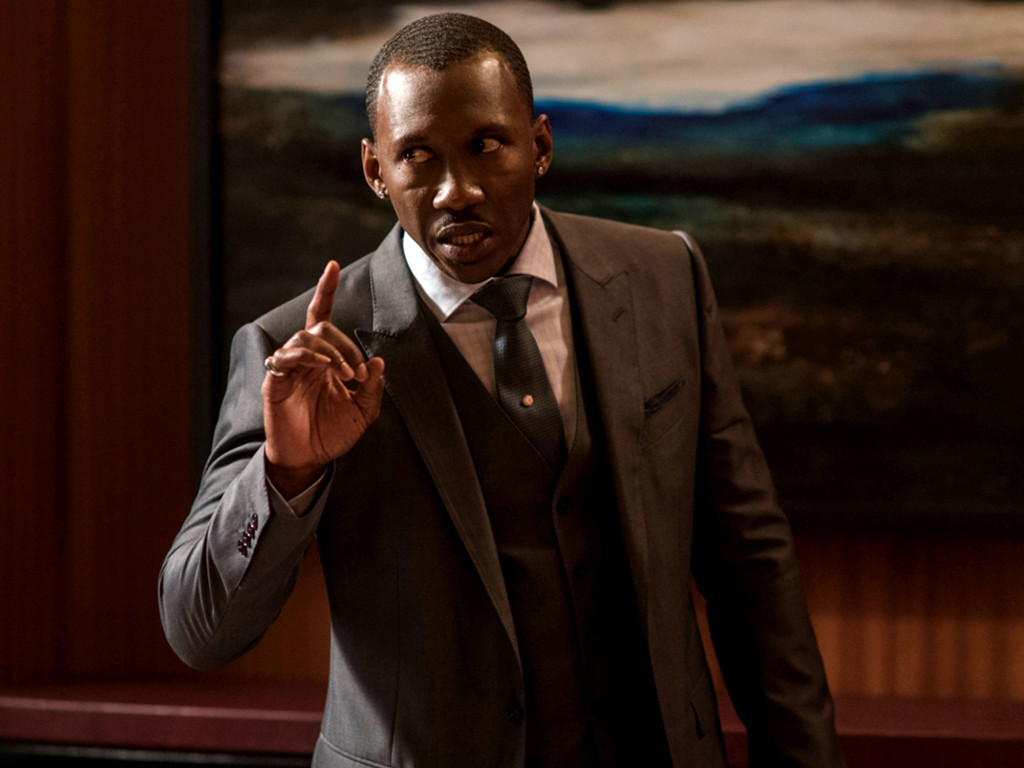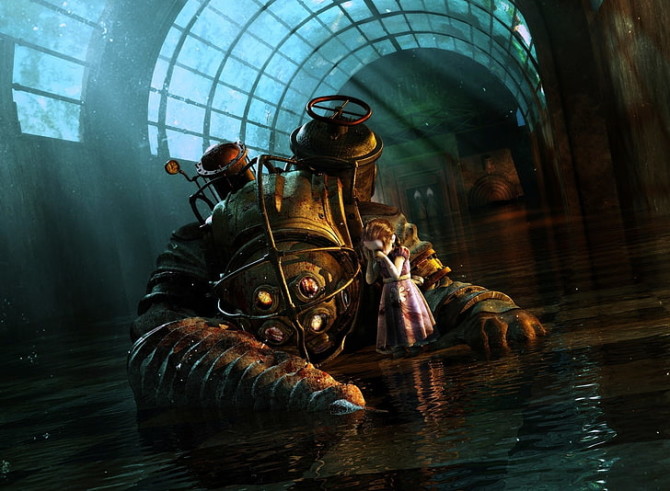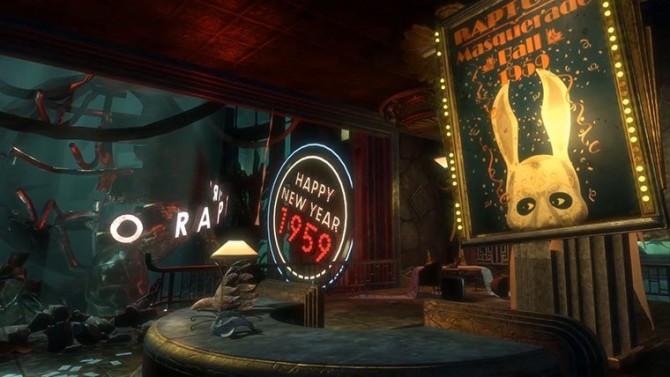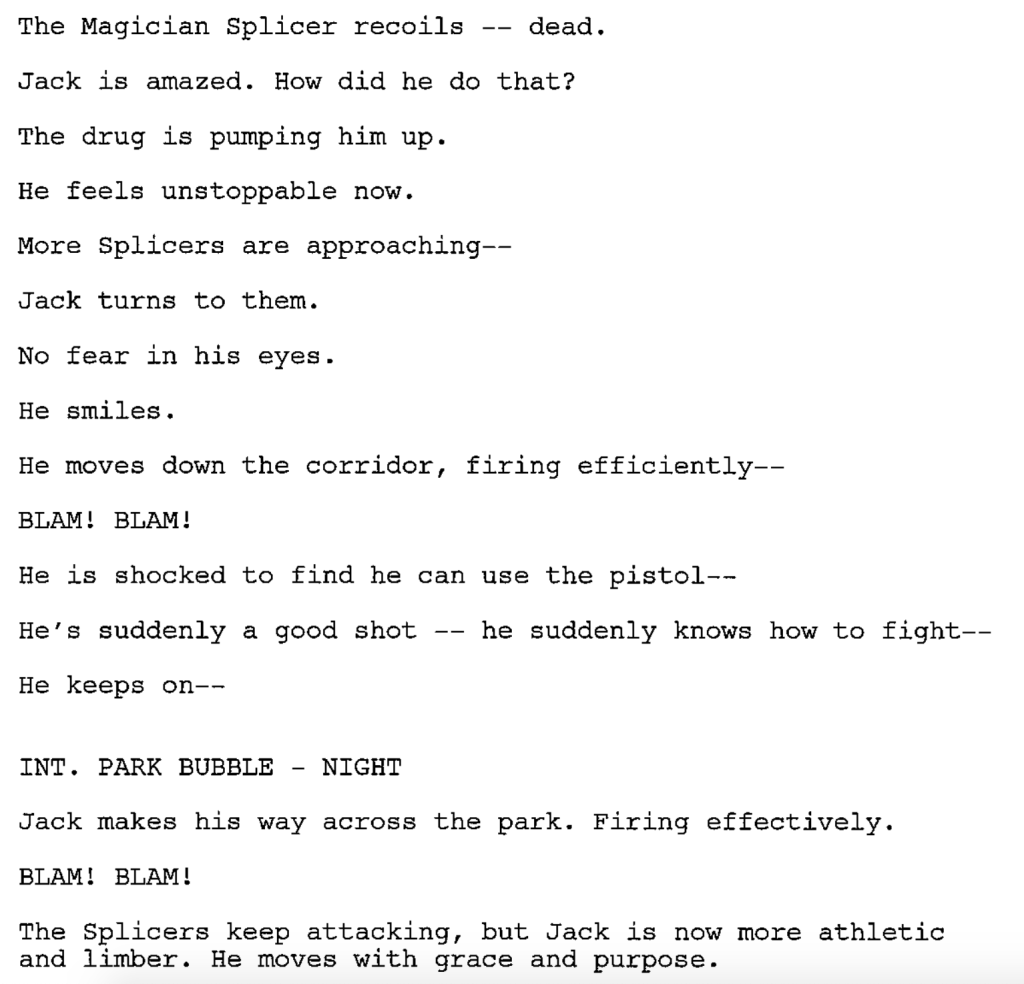Search Results for: F word
Genre: Drama/Supernatural/Comedy
Premise: A family becomes internet sensations when they find a real ghost in their home and start posting videos about it on social media.
About: One of the hot projects that came together this month was the David Harbour Anthony Mackie collaboration with director Christopher Landen (Happy Death Day, Freaky, Paranormal Activity 2). Landen will be adapting the Vice short story by Geoff Manaugh, which you can read here. This one came out of nowhere, as the short story was published all the way back in 2017. Netflix bought the package.
Writer: Geoff Manaugh
Details: about 5000 words (one-quarter of a screenplay)
Today’s story institutes the dreaded 3-genre mash-up. For those new to screenwriting, the 2-genre mashup has resulted in some amazing movies (Comedy and Supernatural = Ghostbusters). But it is REALLY hard to pull off the 3-genre mash-up. Why? Because the more genres, the less focus. And focus is everything in a screenplay narrative.
Now I’m not saying it’s impossible! No no no no no. Don’t you misquote me now. Yesterday’s movie, which I loved, spanned three, maybe even four genres. But the degree of difficulty rises exponentially with multiple genres. And I’m not convinced Ernest rises to the challenge. All things considered, this is such a weird short story, that I’m not going to dismiss it out of hand. It’s worth discussing for sure.
Frank Presley, the newly headhunted president of a suburban hospital-billing firm, has just moved into an old house in the Chicago suburbs with his wife, Melanie, his 14 year old son, Fulton, and his 18 year old son, Kevin. One night, while trying to sleep, Frank hears a noise, goes downstairs, and finds a ghost hanging out.
Frank pulls out his phone camera, presses record, and, for some reason, starts laughing uproariously. He later puts this up on Youtube. People don’t take it seriously because, of course it’s not a real ghost. But Frank keeps seeing the ghost, who he names “Ernest,” and keeps recording it, putting more and more videos online until people can’t deny anymore that it’s a real ghost!
The good vibes don’t last long, though, because Frank is a big fat jerk. He yells at the ghost, tries to scare the ghost, throws things at the ghost, mocks the ghost, and, of course, laughs at the ghost. Melanie is not a fan of the way her husband is treating Ernest. She believes it’s because he hates his work and needs an outlet for his anger.
Then, one day, Ernest disappears. And Kevin does also. The millions of people who watch Frank’s videos pour through them and spot all these background conversations where Kevin and Ernest were secretly chatting with each other. The two have run off together. When the police catch up with them, Kevin tells the world that Ernest was murdered by his uncle and justice must be done!
But the FBI puts Ernest behind bars for the crime of kidnapping. A bummed out Kevin goes on Jimmy Kimmel to make a case for the government to release Ernest. But Kimmel has a surprise. It’s Ernest! Who’s just been released. They verified the murder. And although the uncle who killed Ernest died 20 years ago, Ernest finally has peace. Which means he can disappear into the next realm. Kevin asks if they’ll ever see each other again. Ernest says, without question.
I always love speculating on how a project got purchased. It’s important to study these things if you’re a writer because you want to understand what things buyers are interested in. At first, this seemed too zany to fall into any obvious sale category.
But a couple of things stuck out to me.
First of all, any idea with a ghost in it has the potential to be marketable. If this were a movie about a family that found a normal person living in their house, it’s not nearly as marketable, right? (Although, as I typed that, I realized that could be a pretty interesting movie in its own right) I bring this up because I read so many scripts that don’t have a clear element for a studio to market the movie around. You need that if you want to get people excited about your screenplay.
On top of that, the idea is fresh. I’ve never seen a movie before about a ghost going viral on Youtube. I’m not the biggest fan of the idea. But, objectively, it’s a fresh idea in so much as we haven’t seen it before. So now you’ve got two things working in your favor.
Finally, there’s actually some interesting character stuff going on in this story. The dad clearly has issues. He’s torturing a ghost, laughing about it, and putting it up on Youtube. Wherever there’s interesting character stuff, there are actors who want to play those parts. Between the dad and the ghost, there’s some juicy stuff to play around with here.
The problem is that there isn’t a clear movie structure to this story. I’m guessing that’s why nothing’s happened with it since 2017. It’s kind of hard to see where the movie is.
You can’t tell the movie through Frank’s eyes. He’s too much of an asshole. I suspect that the story will be told from Kevin’s POV, even though he’s a background character for most of the short story. He’s the one who wants to connect with Ernest. You’d probably also move them leaving to earlier in the screenplay. That’s the big “journey” that jumpstarts the narrative so it can’t show up 60% of the way into the story. I’m thinking it should happen at the beginning of Act 2.
And then you would need to clarify why they’re going on this journey, which the short story does a lousy job of explaining. You have to explain that Ernest is trying to solve his murder. In which case you CANNOT under ANY CIRCUMSTANCES have his killer already be dead. There’s no dramatic value in that choice whatsoever. It’s way more interesting if the guy who killed him is still alive and Ernest (with Kevin’s help) is going to confront him.
Speaking of the murder, I kept asking why it took half the story for Ernest to mention he was murdered. Why didn’t that come up earlier? Even if he didn’t want to bring it up, the tens of millions of people studying Ernest on the internet would’ve known his entire life story within ten minutes of him going viral. They would’ve figured out he was murdered, which would’ve necessitated us to explore the murder plot. Here, it feels like something that came up as an afterthought. Oh yeah, and I was murdered.
This is the kind of story that needs somebody really weird to tell it. A Charlie Kaufman type. Maybe even the director from yesterday’s wonderfully weird movie, Anders Thomas Jensen. Christopher Landen is a good director who understands the balance between horror and comedy. But I’m not sure that’s what this is about. This movie wants to make some deeper statements about humanity and Ernest has some, dare I say, Edward Scissorhands qualities to him that will require a deft touch. If Landen can nail it, though, he’s going to jump to the next level as a director.
[ ] What the hell did I just read?
[x] wasn’t for me
[ ] worth the read
[ ] impressive
[ ] genius
What I learned: Who you choose as your main character has a huge impact on the story. Here, you can choose between Frank, a dude who’s having a mid-life crisis and taking it out on the ghost who lives in his house, or Kevin, who’s much more grounded, much more sympathetic, and therefore makes a cleaner protagonist. They were just talking about this issue for the development process of Jungle Cruise. That movie had been in development for a couple of decades. The way they finally cracked the story, according to the producer, was to shift the protagonist role away from The Rock’s captain character and make Emily Blunt’s scientist character the hero. By doing this, it freed up The Rock’s character to be more fun and goofy, similar to what they did with Jack Sparrow in the Pirates movies. If the movie being told in your current draft feels boring, ask yourself, “What would the movie look like through the eyes of [Second Biggest Character] or [Third Biggest Character]?” Ya never know. Your boring movie could instantly come alive. Go ahead, do it right now. I dare ya.
Today’s film will end up in my Top 10 movies of the year, maybe even my top 5!
Genre: Thriller/Drama/Comedy
Premise: After a highly volatile army general loses his wife in a subway crash, a trio of mentally unstable men come to him with evidence that the crash was orchestrated by a criminal organization known as the Riders of Justice.
About: Nikolaj Arcel and Anders Thomas Jensen have written a ton of screenplays together. Anders has something like 25 feature credits. I guess they write and make movies a lot faster in Denmark! Star Mads Mikkelsen has worked with Jensen a number of times. Here’s Mads’ insight into their most recent collaboration process: “As far as I remember, I think Anders Thomas pitched both the story and the idea of morphing his two dramatic universes together: his own “insanity world,” and his more [straightforward] writer side, which writes dramatic things for others … Normally, he pitches me his stuff, and if I call him and say, “What the f**k are you doing?,” then that’s a good sign. Because it’s always insane, what he’s doing, and if I’m on board it gives him the confidence to continue writing.” Riders of Justice is currently a digital rental so you can watch it right now!
Writer: Nikolaj Arcel and Anders Thomas Jensen
Details: 2 hours long
I, of course, could’ve gone and seen “Old” this weekend.
The reason I didn’t was because I could’ve written that review without seeing the movie. I already know what’s going to happen. I know Old is going to be sloppy. I know it’s going to be inadvertently silly at times. I know the last 20 minutes are going to be terrible and not make sense. I know I’m going to get triggered about how someone as untalented as M. Night was able to pull the wool over everyone’s eyes for so long and make a living in this business. I’ve written that review a dozen times already. Nothing ever changes with Night.
Conversely, Riders of Justice may be the most unpredictable movie of the year. You have no idea what’s coming next. Not only that, but everything about this movie screams “This shouldn’t have worked.” The main character is aggressively unlikable. The tone of the movie shifts wildly between dead serious and sitcom-level broad. It’s weird. It’s unruly. It’s unconventional.
I love when scripts take big risks that shouldn’t have worked and somehow make them work because those are the scripts that have the decoded matrix within them. If something works that shouldn’t have, there’s some insight into the fabric of storytelling we don’t usually get.
Here’s a quick breakdown of the story. A teenage girl, Mathilde, and her mother, are riding a packed subway car. Otto, an odd man who uses extreme mathematical equations to predict car accidents, has just been fired from his job. Still, he offers the mother his seat. After she sits down, a sheet of metal from another train slices through the side of the train, killing everyone who was sitting on that side, including the mother (Otto and Mathilde survive since they were standing).
Markus, an army captain currently on duty, gets the call that his wife has died and flies home. Markus, who’s consumed with violence and anger issues, has a terrible relationship with Mathilde. This should be a time of togetherness. But he and his daughter seem as distant as ever. They are soon visited by Otto, who’s been studying the train crash. His computer model has discovered that this was not an accident, but rather a hit. A gangbanger who was also sitting on the fatal side of the train was about to name the Riders of Justice gang in court for a series murders. So the Riders of Justice had the other train deliberately crash into this one to kill him.
A furious Markus is now determined to kill every single member of the Riders of Justice, something he can’t do without help. So Otto enlists his buddies Lennart (who’s spent a large amount of time in a mental hospital) and Emmenthaler (an overweight OCD hacker with anxiety and depression) to help find each of the members and kill them. Of course, when the Riders of Justice figure out what’s happening, they take the fight to our motley unorthodox crew instead.
One of the hardest things to figure out about this movie is how a main character THIS UNLIKABLE could work. We talk all the time about how important it is to make a character likable because if the audience doesn’t like who’s leading them on the journey, they’re not going to care about the journey. And they certainly aren’t going to care whether the hero succeeds or not.
Markus shouldn’t have worked. He’s not only an asshole (one of the first lines we hear from him after he gets home from the mother’s funeral is to tell Mathilde that she needs to work out so she doesn’t get fat) but he doesn’t talk a whole lot. When someone’s an asshole and ALSO doesn’t say much, it exaggerates the assholeness. We’re not able to get inside their head to understand why they’re an asshole, so the fact that Markus just stares forward angrily all the time makes him even more unlikable.
So why do we still care? Why do we root for Markus?
Well, when you have an unlikable hero, it’s critical that you incorporate something called OFFSETTING. Offsetting is exactly what it sounds like. You come up with a bunch of things to offset the hero’s negative disposition. For starters, Markus’s wife was just killed. We’re always going to feel sorry for a character who’s just lost someone.
Markus is active. Audiences love active characters. They love characters who go after what they want. The more aggressively they go after it, the more we tend to like them. As soon as Markus realizes that his wife was murdered, he goes into Active-Mode. It’s time to kill the Riders of Justice.
Audiences also like characters who are good at what they do. There’s a scene early on where Markus goes to ask their first ‘person of interest’ what they know and the guy sticks a gun in his face and tells him to leave. Markus doesn’t say anything, lets the guy close the door on him, walks back to his car, and then, out of nowhere, he spins around, walks right back up to the door, knocks, and when the guy opens the door with the gun, Markus executes a blink-and-you-miss-it takedown of the guy, snatching his gun away then shooting him in the face. It’s not only an intense scene. It shows how skilled Markus is. After that moment, we think, “Yeah, I’m glad this guy is on our side.”
Another thing I noticed Jensen do was he offloaded more screen time than normal to the other characters. Riders of Justice is more of an ensemble piece than a “John Wick” style revenge movie. The reason why that’s important is because all of the other characters are interesting and positive and cool and fun. So we’re not stuck, 90% of the time, with this dreary angry man. That’s a big takeaway for me. If you have an intensely negative hero, consider making your script more of an ensemble piece.
The other thing about this script that shouldn’t have worked was the tone. On one side, you had Markus living in the most extreme intense dramatic movie you could imagine. While on the other side, you had Denmark’s version of Larry, Mo, and Curly.
There’s this whole subplot whereby Mathilde insists that her father see a psychiatrist for his anger issues and when she catches him talking to Otto, Lennart, and Emmenthaler in their barn, the four of them freak out and lie to Mathilde, telling her that they’re Markus’s new psychology team, here to make him better. They’re going to be sticking around for a few weeks and working with him 24/7. At one point, the ruse goes so far that Lennart, who, remember, is certifiably crazy, pretends to be a psychiatrist and does a therapy session with Mathilde. I mean that’s a scene you might see on Modern Family.
It took me a while to figure out how they made this work. Because this is the kind of thing I routinely rip screenwriters for – jumping back and forth between wildly different tones. What I realized was that these three characters weren’t just wacky to be wacky. As the movie goes on, we get into all of their backstories, which inform us why the three of them are so broken. In other words, their psychosis is anchored in reality. It’s not like Jensen said, “Eh, let’s just make him a goofball hacker and have him say funny nonsense.” This hacker has led a tortured life, as have the other two.
I still don’t think many writers could’ve pulled this off. But the ones who can are the ones who build up those backstories so that the “crazy” characters’ lives are based in some level of reality.
In the end, the thing I liked most about this script is that it morphed into this unexpected family movie. All these weird people were living together under one roof. And despite being the most unlikely family ever, they managed to make it work in a weird way. There was something sweet about that. And I don’t think I’ve ever used the word ‘sweet’ to describe a John Wick style premise. Riders of Justice shows you how to subvert expectations THE RIGHT WAY. If you liked Parasite, you’ll definitely like this.
[ ] What the hell did I just watch?
[ ] wasn’t for me
[ ] worth the stream
[x] impressive
[ ] genius
What I learned: Always try to link your hero’s journey to what you’re personally going through in life at the moment. It will instantly add depth to them. Here’s Anders on how he came up with the character of Markus: “It started with me having this completely normal 40-year crisis that all men have where you look at your kids, you look at your life, and you wonder, “How did I get here, and did I do enough?” You start rebuilding, you start looking forward, and you start looking for connections that will give your life meaning. That’s basically Markus’ character, a guy with PTSD returning home who’s lost faith in everything but needs to find a way to move forward in his life. Of course, it’s highly dramatized, but the core is very personal for me.”
What I learned 2: Anders is okay with ditching outlines if the script calls for it: “Normally, I’ll put a structure up on the wall then write a script from that. But with a script like this, it was a gut feeling. Especially in this film, it had to be a gut feeling. You had to get around so many characters and themes and layers, and if you put that up on the wall, it becomes somehow schematic. You can see the technicality of it. People in film schools hate when I say this, but it’s not something I can teach anyone.
Is Space Jam 2 secretly a great movie??? Why did Black Widow drop so much in its second weekend? Has Cannes ever given the Palme D’or to a good film?? And Carson offers a book recommendation!
Out of morbid curiosity, I threw on Space Jam this weekend. It was on HBO Max 4 free so why not? My enjoyment of the film, if you can call it that, was inconsistent at best. There is only so much fun an adult can have with a movie that’s made for 11 year-olds. But when I turned off my brain and leaned into that kid who thought Saturday morning cartoons were the coolest most awesomest things that life had to offer, I enjoyed myself.
But I’m not here to review the film. I’m here because I had an epiphany while watching the movie. Are you ready for it? Here it is: Every screenwriter should write at least one family movie. Even if you never show that script to anyone, you should still write it. Let me explain why.
A family film allows you to practice executing all of the big screenplay beats without fear of overdoing it. Since family films are not put under the same microscope as, say, a David Fincher movie or a Noah Baumbach film, you can practice all of the things you’ve learned on screenwriting websites without having to worry about being too on-the-nose. That’s because kids movies ARE on-the-nose.
Take, for example, the hero’s arc. This is the most classic story beat there is. You have a main character. They have some sort of problem in their lives holding them back. The journey they go on is about realizing why this issue is hurting them, and ultimately learning that there’s a better, more fulfilling, way to live life. This transformation – or “arc” – leaves the audience feeling happy because they, too, have issues holding them back. They feel that if this movie character can overcome their flaw, they can overcome theirs as well.
But a character arc is quite a delicate measure to pull off. It looks easy when it’s done well but there are a lot of places where you can screw it up. A common issue is that the writer will say, “I don’t want to overdo it,” and be reallllllyyyyyyy subtle in how the flaw plays out. They’ll hint at it on page 30, hint at it again on page 50, before finally having them overcome it during the climax. When the reader asks, “What was that whole thing at the end where the hero said to his daughter he was going to donate his life savings to cancer research?” The writer replies, “It’s because he’s no longer greedy! The hero finally realized that money isn’t what matters. It’s family!” The reader responds with a side glance. “The hero’s flaw was that he was greedy?” And the writer dies a little inside.
The great thing about kids movies is that you can lean into this stuff and not worry about it coming off as corny or on-the-nose. In Space Jam, Lebron James’s son doesn’t want to be a basketball player. He wants to make video games. Lebron can’t accept that his son doesn’t want to play basketball and keeps pushing him to ditch the computer and practice his jumper.
After Lebron gets sucked into the Toon world, where he and the “Toon” squad are up against the “Goon” squad, Lebron keeps telling his teammates what to do. Move the ball up the court quickly. Set picks here. Step back, crossover when the other player is too close. Dunk. Etc. The results are not good. By halftime, they’re down 1000 points.
Lebron asks the team what’s up? Why are you playing so bad? They concede that they’re doing what he told them to do – be like him – but it’s not working. Lebron has his big epiphany. Just like with his son, everybody here has their own talents. He can’t make them be like him. He has to let them be themselves. Lebron has arced! And, of course, once the toons can start doing toon things (Roadrunner painting a fake desert canvas that the Goon players disappear into) they start winning.
Now some of you may be rolling your eyes. “SOOOOO ON-THE-NOSE. SOOOOO CHEESY.” That’s the point. You can’t learn to execute a flaw subtly if you’ve never executed a flaw effectively in any situation. This holds true for all the big screenplay beats: the inciting incident, the refusal of the call, the fun and games section, the midpoint escalation, the central relationship conflict, making the final goal seem impossible. When you write a children’s movie, you get to master all this stuff without the cynical rolling eyes of the high-expectation moviegoer.
Every genre has a slightly different expectation when it comes to screenplay beats. The kid’s movie is on-the-nose. The buddy-cop movie is a still on the nose but a little less so. The serious action movie, like Jason Bourne, is more subtle still. All the way up to Oscar dramas, where the goal is to camouflage your screenplay beats to such a degree that the audience is unaware that the movie was even written in the first place.
So go write that family film. The good news is that if it’s actually good, it’s one of the most profitable genres in the business. So you could get paaaaaaaaaid.
Moving along, Black Widow did not do well on its second weekend at the box office, dropping a widow-making 67%. For some reference, the last Marvel movie to be released, Spider-Man: Far From Home, dropped 51% on its second weekend. If we want a closer comp, we can use Captain Marvel, which dropped 55%. The reason 55% is so concerning is that Captain Marvel was a brand new character. Black Widow is a known character who had been around for a decade. If anyone should have the lower drop, it should be the proven character.
What does this mean? Hard to tell. Everything in the post-pandemic box office world is hard to gauge. Who knows how many people are buying the movie from Disney’s “Premiere Access” service. To be honest, as I’m writing this, I’m not even sure if they’re including the money they got from Disney + in that final box office haul or not. If it is included, that means even fewer people went out to watch the movie.
I did hear something interesting about Black Widow from Half in the Bag’s review this week where they said Marvel starts creating their action set pieces before the director has even been chosen. I don’t know how accurate this information is and I’m sure it differs from project to project. But it would certainly explain why Black Widow’s set pieces felt disconnected from its family-oriented storyline, which I found to be pretty good.
I’ve actually wondered this for a while. How is it that Marvel is recruiting these directors who have never shot an effects shot in their entire careers, and putting them in charge of action set pieces that, individually, cost ten times as much as the most expensive movie they’ve made? I guess that’s the answer. Marvel says “F U, newbie. We’re going to shoot the action scenes ourselves and you can record your little two-people-in-a-room-talking scenes when we call on you.” I think one of you pointed this out in regards to Eternals. They’re having all sorts of issues balancing Chloe Zhao’s muted heavily dramatic character stuff with the big fancy set pieces. As a result, Zhao has been pushed to the side while second unit directors with more experience finish the movie.
This probably goes on more than we know. We heard this same thing happening all the way back with Rogue One, with Gareth Edwards not being able to handle the grandness of his super-movie. So they replaced him with Tony Gilroy. All of this is a result of Hollywood moving away from bland but experienced directors (aka Ron Howard) to “visionary” but inexperienced directors. These directors bring vision. But never having been on a giant set before or having filmed a giant set piece, they need help. So studios, I guess, have come up with this hackneyed solution to the problem, separating the effects directing team from the film directing team.
I think this is why Kathleen Kennedy loved Rian Johnson so much. She thought she had the best of both worlds. She got a director who has a unique vision who ALSO made enough movies that he didn’t need babysitting. She could just leave him alone to make his movie. Of course, her Rian Johnson beer goggles kept her from realizing he’d written a garbage script. Which just goes to show how difficult making a good movie is. Even when you think you’ve got all your bases covered, you can still make a terrible movie (“Hey, I got an idea. What if we made the most iconic hero in movie history, Luke Skywalker, as unlikable as possible? Who’s with me?”).
Elsewhere, the Cannes Film Festival just wrapped. If you’re looking for movies that are guaranteed to be bad, look at whatever the Cannes Film Festival celebrates. You may say, “Carson, why are you such an indie film hater?” That’s not what this is about. The French Film Industry refuses to put any stock into the trade of screenwriting. Nobody cares about screenwriting over there. All they care about is the director. This is why they celebrate so many movies that are terrible. Because they don’t care if the story makes sense. All they care about is what the film looks like.
Another problem with Cannes is that they hate Hollywood so much that they are determined to celebrate the opposite of whatever comes out of the studio system, even if that means propping up something terrible. It’s more important to NOT be Hollywood then to find actual good movies. To a certain degree all film festivals are like this. Sundance is pretty pretentious itself. But Cannes is the worst.
Now, I will admit they’ve gotten it right a few times. Parasite was amazing. And The Square was pretty cool as well. But they often prop up weird, nonsensical, boring films that are rewarded for things other than storytelling. I don’t know where the word “pretentious” derived from, but I always look at it as a derivation of “pretend.” All of these Cannes films are people pretending to make something profound when, in actuality, once you look past the directing, they’re just as vapid as the worst Hollywood flicks. By the way, how the heck didn’t The French Dispatch win the Palme D’Or? It’s not only black and white (any black and white film entered into Cannes is automatically placed in the Top 5). But it’s got “French” in the title! So disappointed in Wes Anderson.
Let’s end this Mish Mash on a positive note. As you know, I loved Sally Rooney’s Normal People on Hulu. I thought it was excellent. I recently found out the same filmmaking team, including the awesome Lenny Abrahamson, are filming Rooney’s first novel, Conversations with Friends, as a follow-up. So I picked it up and read it. I wanted to see what it was about Rooney’s writing that allowed it to be adapted into something so powerful. And, holy s#%@. I was not disappointed.
Rooney is an exceptional writer. The premise of the novel is simple (you guys know I like simple stories!). A young spoken word poet starts dating an actor who’s married to a journalist doing a story on her. You’d look at that and think, “How do you get more than 50 pages out of that? That’s a subplot for any other novel.”
But Rooney somehow makes it compelling the whole way through.
Part of it is her inherent talent to communicate the complexities of the human experience better than any writer in recent memory. She has these insights into the minutiae of human interaction that are consistently illuminating. You sit there and you think, “I’ve always thought that abstractly but have never been able to communicate it the way she just did.” And she mixes in this deft touch of dry humor every once in a while which turns what should be sad moments into something really funny.
My discovery that I was in love with Nick, not just infatuated but deeply personally attached to him in a way that would have lasting consequences for my happiness, had prompted me to feel a new kind of jealousy toward Melissa. I couldn’t believe that he went home to her every evening, or that they ate dinner together and sometimes watched films on their TV. What did they talk about? Did they amuse each other? Did they discuss their emotional lives, did they confide in one another? Did he respect Melissa more than me? Did he like her more? If we were both going to die in a burning building and he could only save one of us, wouldn’t he certainly save Melissa and not me? It seemed practically evil to have sex with someone who you would later allow to burn to death.
As you can see, her writing is simple. It’s easy to read. As you guys hear me talk about all the time, making your writing easy to read does you so many favors. I’ve come across lots of strong concepts that were ruined by writers who were trying to prove to you that they were Writers with a capital “W.” Rooney reminds us that you can convey everything you need to using simple words embedded in basic sentence structure.
I know she’s not for everyone. I’m not trying to convert anyone here if you’re not into these types of books. But if you liked Normal People and you like good writing and you want to be inspired, definitely check out Conversations With Friends. It’s really good.
Today I review a script by the writer of the NUMBER 1 screenplay on my Top 25 List, E. Nicholas Mariani!
Genre: Drama/True Story
Premise: A black lawyer attempts to free 87 black men who were erroneously charged with killing a white man in 1919 Arkansas during the height of the Jim Crow era.
About: E. Nicholas Mariani needs no introduction on this site. He is the author of the number one script on my Top 25. Somehow, 41 other scripts scored higher than this one on the 2018 Black List. Injustices all over the place!
Writer: E. Nicholas Mariani
Details: 180 pages!
You know, if there’s one thing I like about Nicholas Mariani, it’s that he doesn’t swing for doubles. He swings for grand slams. He goes ALL IN with The Defender. And when you go all in, you either fall on your face in spectacular fashion, or you win an Oscar. Let’s see where The Defender’s going to end up.
It’s Little Rock Arkansas, 1919. World War 1 has just ended. It’s a celebratory day in town. Except for 55 year old black attorney Scipio (pronounced ‘Sippy-oh’) Africanus Jones, who’s just watched yet another black man he’s defended, a soldier no less, hanged.
Scipio is an interesting person. He was born a slave. He worked the cotton fields. He then clerked at a law office where he became a self-taught lawyer. He’s since become very well-respected by people of all colors in town.
But that respect is about to be tested. A young black man named Robert Hill comes to Scipio’s office and asks him to help him form a union in downstate Elaine, a town with lots of black people working the cotton fields. Scipio tells him he’s nuts. The second they find out that black people are forming a union, they’ll come after him. But Robert says he’s doing it anyway.
A few days later, Scipio gets the news that black people down in Elaine who were planning to take over the town killed a white man. In the process, all 87 of the men who were conspiring to do this are in jail. Against his better judgement, Scipio goes down to Elaine, where he finds out that nothing about the stories in the paper were true.
A group of white people attacked the church where the black people were planning the union and accidentally shot one of their own in the back of the head. This created a frenzy and all the white people in town went to hunt down black people. Somewhere between 300-1000 black people were killed.
Scipio realizes that the odds are against him for saving these 87 men, 12 of whom refuse to enter a guilty verdict, meaning that they will all be hanged. But Scipio is one of the most clever lawyers you’ll ever meet so he concocts a multi-leveled plan that will invoke laws that pre-date the American legal system, all in the hopes of winning a case that, if he succeeds, will change America forever.
I had little doubt I was going to like this one.
Mariani is the real deal. How he’s not pulling in million dollar rewrites on Oscar-hopeful projects is beyond me.
My only real criticism of the script is that it’s too long. But Mariani is one of those rare writers whose scripts are so easy to read (even when they’re dealing with serious subject matter) that the script doesn’t feel nearly as long as it is.
Let’s start at the beginning and move our way through the script.
As I’ve told you a million times, how a script begins tells the reader everything he needs to know about if the writer has the goods. If you start with something boring, the reader expects a boring script. If you start with something clumsy and unclear, the reader expects a messy script. If you start with something cliche, the reader expects a cliche script.
There’s an early scene here where a black man is being marched to his hanging in Little Rock, Arkansas in 1919. Tell me how you imagine this scene. Would there be a large group of white people screaming the n-word at the black man as he’s marched to a tree? Would there be an evil sheriff with a wide grin on his face as he eagerly anticipates the man’s death? Would the sheriff then give a speech to the crowd of people about how “this is what happens” when you “disobey the law” complete with a drawn-out southern accent?
I’m guessing 90% of you imagined that scene.
Which is the number one sign that you shouldn’t write that scene. Good writers avoid expectation and cliche. If they feel like they’ve seen it, they’re going to look for another way to write it.
In Defender, the scene takes place right there in the prison yard. The white warden is not happy that he has to lead this man to his death. There is no crowd cheering. The moment is sullen. Regardless of skin color, nobody is comfortable with what’s happening. And when the death is imperfect and the victim suffers, everyone is mortified. Nobody feels good about it.
This scene let me know I was in good hands. I knew the writer wasn’t going to execute scene after scene in the cliche most predictable fashion possible.
Next up we’ve got our main character, 55 year old Scipio Africanus Jones. This character is so damn likable, which is a big reason why this script works so well. A lot of producers and executive types toil over how to make characters likable, as if there’s a secret handbook that keeps all these tricks hidden from the world. But, in reality, you just have to think of what makes a regular person likable. Scipio sticks up for the little guy. Scipio watches, sadly, as a friend hangs, powerless to do anything about it. Scipio is friendly to everyone. Scipio is intelligent. Scipio stands up for himself. There’s no magic formula here. Just imagine what makes you like people in the real world and apply it to your character.
Mariani is also a great scene-writer. Good scene-writing DOES have its own secret playbook and the only way to access it is to write a lot and figure out what works and what doesn’t. Mariani’s scene-writing book seems to be quite large. There’s an early scene that occurs in Elaine where Scipio heads to the courthouse to make some requests from the judge.
This is a pretty standard setup for a scene – two people talking in a room. So to make it more exciting, Mariani adds a scene agitator (you can learn about scene agitators in my book) where the entire town has just gotten back from the funeral of the white man who was killed. So they storm the courthouse, screaming and yelling, seemingly on the brink of breaking in. That basic “two people talking in a room” scene all of a sudden becomes a lot more charged.
I feel like I’m going over the advanced screenwriter’s playbook here, there are so many impressive things Mariani does, but what can I say? He’s a great writer. For example, he could’ve easily had Scipio head to Elaine based off of newspaper headlines alone. Most writers would’ve done it this way. But Mariani knew that it would be better if both Scipio and the audience had a personal connection to the massacre.
So he writes a scene beforehand where Robert Hill comes to his office and tells him about the union he wants to form down in Elaine. We like Robert immediately because he’s fighting for the disenfranchised and because he’s brave. This way, when the news of Elaine hits the papers, both us and Scipio have a vested interest in going down there. It’s choices like this that turn good scripts into great scripts.
Another advanced choice Mariani made was that not every white person who stood in Scipio’s way was bad. In some cases, these men wanted Scipio to win. But they also had their own interests to protect, which led to a lot of difficult choices for both sides. This is where you can really create a powerful story – when you make things difficult for your characters.
Scipio’s most powerful ally is Governor McRae. McRae is motivated by reelection. He wants to make sure that he doesn’t seem too sympathetic to the black populace of Little Rock, which is why he’s leaning towards convicting these 87 men. Normally, you’d think, “well f*$# him.” The problem is that Governor McRae’s opposition is a full-on racist. So Scipio has to play things very delicately. He needs McRae on his side. But McRae can’t be too on his side because then McRae might lose the election, which means Scipio’s town will now be ruled by a man who supports the Ku Klux Klan.
I loved this because it made you think. There was some real strategy involved in every choice Scipio had to make. By far the biggest issue I run into with scripts that deal with race is that they’re too black and white. There’s no subtlety anywhere in the story. Those are the easiest scripts for me to put down.
I don’t know what’s up with me this week because yesterday I was tearing up during Black Widow. Then during this script I was practically bawling by the end. But man, this was a really good script. If you’ve got the time and you want to become a better screenwriter, read this script. This is what top-level screenwriting looks like.
[ ] What the hell did I just read?
[ ] wasn’t for me
[ ] worth the read
[x] impressive
[ ] genius
What I learned: Nothing should ever be given to your characters for free. A representative from the NAACP shows up offering money and positive press coverage to Scipio. But if they give it to him, they want to be the face of the trial. They want all the glory if they win.
Genre: Sci-Fi/Horror
Premise: After his plane crashes, a man finds himself stuck in a giant deserted 1950s city at the bottom of the ocean.
About: Bioshock was heading towards production a decade ago when, just weeks before shooting started, it was cancelled. But according to lore, it was not cancelled because they couldn’t get the script right. It was cancelled because the studio got nervous about a 200 million dollar R-rated film, particularly when there had been so many high profile video game adaptation failures recently. For all intents and purposes, the script might have been great. You think that with content hungry streamers desperate to find the next big thing, Bioshock is going to find a home at some point, likely as a series.
Writer: John Logan (Gore Verbinski was set to direct)
Details: 111 pages
I’m trying to inspire you guys with some A-grade sci-fi world-building here.
John Logan is a fascinating screenwriter. He’s credited with over a dozen high profile studio movies (Skyfall, Alien: Covenant, Hugo, Sweeney Todd, The Aviator, The Last Samurai, Star Trek: Nemesis, The Time Machine, etc.). Yet he doesn’t have a single movie that you actually remember and want to revisit (with the exception of, maybe, Gladiator). In many ways, he’s the ultimate studio screenwriter. And what I’m going to try and do today is figure out what John Logan does to be so perfectly suited to write big budget studio movies.
Let’s take a look.
The opening to Bioshock is basically the opening to The Graduate. So much so that they might be able to save money just by buying the dailies to the Mike Nichols film. It’s 1960. A guy name Jack just graduated college. His rich father wants him to join the firm. We see his graduation party with all his dad’s friends, many of them obsessed with their golf swings. His father takes him to work the next day, shows him his pathetic little office, and Jack has a mental breakdown. There is no way this is going to be his life.
Cut to Jack on a Pan Am flight to Barcelona. Jack doesn’t have a game plan once he lands in Barcelona. He just knows that he wants to get as far away from Mrs. Robinson as possible. Luckily, he won’t have to figure it out because his plane crashes Castaway style. Jack survives and swims to a lighthouse. But, once inside, he finds himself being shot down into the ocean via an elevator and arriving in a giant underwater city from the 1950s.
The place is dilapidated with debris and puddles everywhere. After watching a monster creature slice a young mother apart, Jack runs into an Irish guy named Atlas who’s one of the last people in the city not to have turned into a crazed monster. He tells Jack there’s a sub on the other side of the city. That’s the only way out of here. And so off they go, across this monster-infested cesspool, to try and get out.
Along the way, Jack sees a lot of curious things. For example, when he stumbles into a “Leave it to Beaver” household, he sees a picture of his dog from back home on the refrigerator. What’s going on? We get the sense that there’s a mystery to be solved here and that his new “friend,” Atlas, may be hiding the answers from him. Which means Jack will have to decide whether to trust him or figure his own way out of this hellhole.
I think I found what I was looking for regarding how John Logan became the ultimate studio screenwriter. He understands a simple truth – that everybody loves easy-to-read scripts. That means scripts that are clean and sparse on the page. He only writes what is necessary. Nothing more. And he favors vertical screenwriting (the act of writing a bunch of short sentences so the eyes fly down the page “vertically”) when possible.
I’ve always thought that the only purpose for easy-to-read scripts was to placate spec screenplay readers. You’re a nobody writer. You’re trying to keep the attention of overworked readers who are reading your script at the end of their days. It makes sense to keep the writing as sparse as possible.
Conversely, you shouldn’t need to do this as a studio screenwriter. In Logan’s case, he’s working directly with producers and directors. He’s not having to work his script up the industry ladder, winning over reader after reader after reader. If he wanted to write 8 line paragraphs for 150 pages straight, he could do that.
So why doesn’t he?
Maybe the reason Logan is so successful is because he keeps the spec screenwriter mindset as a professional. If Gore Verbinski thinks, “Wow, John’s scripts are so much easier to read than that last writer I hired,” he is more likely to hire him again. Right?
Just to be clear, there is no correlation between “easy-to-read” scripts and “a good movie.” In fact, if there’s any correlation, it’s a negative one. The less words you put on the page, the less you have to go on when making the film. That’s the paradox of screenwriting. The way to write a successful screenplay is not always the way to write a successful movie.
But John seems to understand that the most important job of a Hollywood screenwriter is to keep your bosses happy. Make their jobs as easy as possible. Why write some 150 page opus with 65 characters, multiple timelines, and constantly shifting narratives that you’ll need a 10 hour Zoom call to explain when you can write these easy effortless scripts that everybody reads and thinks, “Wow, that was enjoyable.”
I admit I may be oversimplifying things but I think there’s something to this.
Because, as a movie, this story isn’t very good. It’s kind of stuck between a sci-fi script, a horror film, a supernatural film, and an all out zombie flick. I think that works in the video game world where all you want to do is be scared and shoot cool-looking creatures. But when you smash all of that stuff into a movie script, it feels a bit “everything and the kitchen sink.”
I think this would’ve worked best if they ditched the action. I know that sounds crazy but the coolest thing about this world is how spooky it is. A straight-up mystery built inside a creepy abandoned city is all you need. Injecting stupid blue liquid into our veins to become stronger and fighting off giant creatures… that’s great for video games. Dumb for movies. I suppose you could argue that Aliens balanced action with horror. But Aliens wasn’t a mystery about a singular person who got stuck inside a mysterious city. It’s entire concept was built around action (a group of military men head to a base infested with aliens).
The underwater setting of this movie is so cool that it ALMOST offsets the script’s weaknesses. But, in the end, like the creatures of Bioshock, there are too many of those weaknesses to overcome. I would probably check this movie out if it showed up on Amazon. But I’m not convinced I would make it through the entire thing.
Script link: Bioshock
[ ] What the hell did I just read?
[x] wasn’t for me
[ ] worth the read
[ ] impressive
[ ] genius
What I learned: Utilize GENUINE CURIOSITY to camouflage exposition. In order to get inside Jack’s head about why he’s moving to Barcelona, Logan introduces a flight attendant who Jack starts flirting with. They get to talking and the flight attendant is genuinely curious about Jack’s life. This is the ideal time to slip in exposition because any questions the attendant asks will be genuine. She likes him. She wants to know about him. So when she asks “Why Barcelona” and Jack explains what led to the choice, it doesn’t feel at all like exposition is being doled out. It feels like two people getting to know each other. Conversely, if Jack had initiated his reasons for going to Barcelona on some random person sitting next to him in the plane, it would’ve felt like Exposition City.


